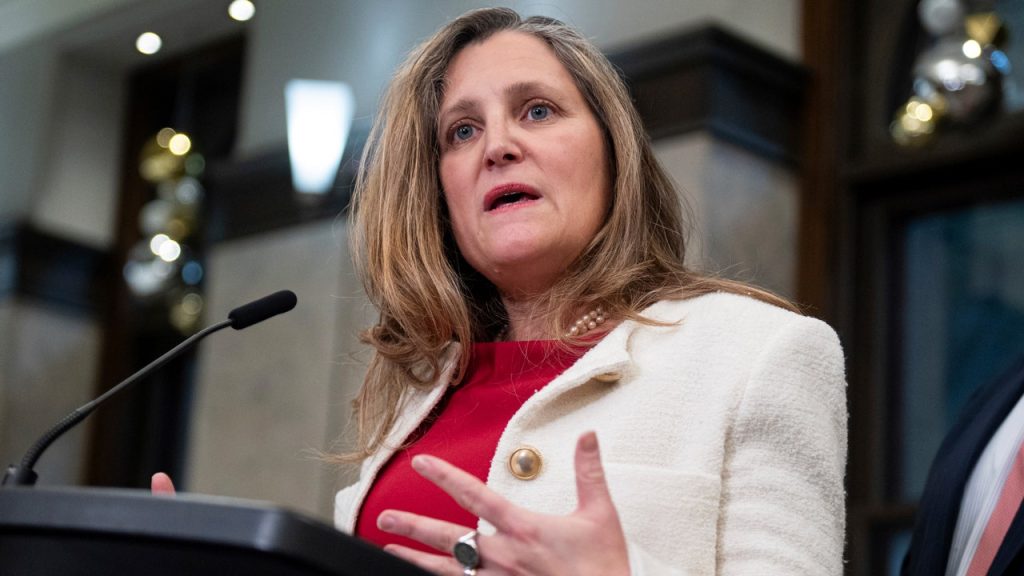The unexpected resignation of Canadian Finance Minister Chrystia Freeland has sent shockwaves through the Canadian political landscape, posing the most significant challenge to Prime Minister Justin Trudeau’s decade-long leadership. Freeland, a highly regarded figure within the Liberal party and a key architect of Canada’s economic policy, announced her departure on Monday, citing irreconcilable differences with Trudeau regarding the government’s economic direction, particularly in the face of potential trade conflicts with the incoming US administration under President-elect Donald Trump. The timing of her resignation, just hours before she was scheduled to deliver the crucial fall economic statement, further amplified the impact of her departure and fueled speculation about the stability of Trudeau’s government.
The resignation letter, publicly released by Freeland, highlighted the growing rift between her and Trudeau. She explicitly criticized the prime minister’s recent economic policies, including a proposed sales tax holiday and cash payments to Canadians, arguing that such measures were fiscally irresponsible given the looming threat of US tariffs. Freeland emphasized the need for fiscal prudence and preparedness for a potential trade war, a perspective seemingly at odds with Trudeau’s approach. This public airing of internal disagreements exposed a significant crack within the government and raised questions about Trudeau’s judgment and leadership style.
Adding to the political turmoil, Freeland’s resignation comes at a time when Trudeau’s popularity is already waning. Concerns about inflation, immigration policies, and the government’s handling of the economic recovery from the COVID-19 pandemic have eroded public confidence in the Liberal government. This vulnerability has emboldened opposition parties, with both the Conservatives and the New Democratic Party (NDP) calling for Trudeau’s resignation and a snap election. The Conservatives have seized upon the situation to portray Trudeau as a weak and ineffective leader, ill-equipped to navigate the challenges posed by a resurgent Trump administration and the potential economic fallout from trade disputes.
The NDP, whose support is crucial for Trudeau’s minority government to maintain power, has also intensified its pressure on the prime minister. While stopping short of formally withdrawing their support, NDP leader Jagmeet Singh has publicly called for Trudeau’s resignation, signaling a potential shift in the political dynamics that could trigger a no-confidence vote and force an early election. The Bloc Québécois, another opposition party, has joined the chorus demanding Trudeau’s departure, further isolating the prime minister and increasing the likelihood of a political showdown.
Trudeau’s position is further complicated by the timing of the resignation. With a federal election looming before October, the loss of a prominent figure like Freeland weakens his party’s standing and raises doubts about the Liberals’ ability to secure a fourth consecutive term, a feat not achieved by any Canadian prime minister in over a century. The resignation also deprives the government of a skilled negotiator and experienced hand in managing the crucial relationship with the United States, particularly at a time of heightened trade tensions. Freeland’s expertise in international trade and her close involvement in previous negotiations with the Trump administration made her an invaluable asset to the Canadian government, and her absence leaves a significant void in the cabinet.
The unfolding political drama also raises questions about the future direction of the Liberal Party. While Trudeau has expressed his intention to lead the party into the next election, speculation persists about potential successors. Freeland herself was often seen as a potential future leader, and her departure could pave the way for other contenders to emerge. The possibility of former Bank of England and Bank of Canada Governor Mark Carney joining Trudeau’s cabinet adds another layer of intrigue to the situation. Carney, a respected figure with a strong economic background, has long been rumored to have political ambitions, and his potential entry into the political arena could significantly reshape the landscape within the Liberal Party.


